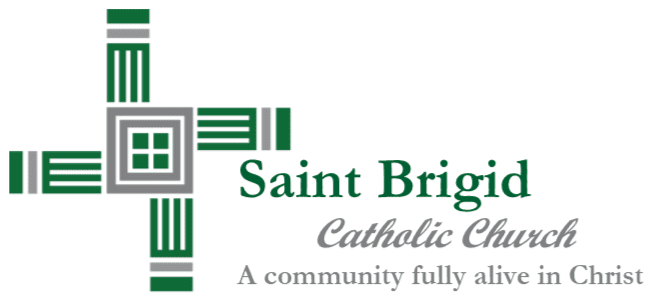“The sacraments are efficacious signs of grace, instituted by Christ and entrusted to the Church, by which divine life is dispensed to us….They bear fruit in those who receive them with the required dispositions.” Catechism of the Catholic Church, 1131
“The whole liturgical life of the Church revolves around the Eucharistic Sacrifice and the sacraments. There are seven sacraments in the Church: Baptism, Confirmation, Eucharist, Penance, Anointing of the Sick, Holy Orders, and Matrimony.” Catechism of the Catholic Church, 1113
Click each Sacrament below to show more information.
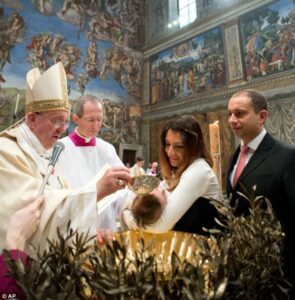 “Through Baptism we are freed from sin and reborn as sons and daughters of God; we become members of Christ, are incorporated into the Church, and made sharers in her mission. Baptism is the sacrament of regeneration through water in the Word”. Catechism of the Catholic Church, 1213
“Through Baptism we are freed from sin and reborn as sons and daughters of God; we become members of Christ, are incorporated into the Church, and made sharers in her mission. Baptism is the sacrament of regeneration through water in the Word”. Catechism of the Catholic Church, 1213
If you are a parent seeking the Sacrament of Baptism for your child, please click here
If you are an adult seeking the Sacrament of Baptism, please click here
Infant Baptism is generally scheduled during a weekend liturgy, except during the Seasons of Advent and Lent. Baptism is a communal celebration, as are all sacraments. The process of welcoming new members into the faith involves the participation of the parish community who, as part of the rite, promise to be credible witnesses for those entering our Christian community through the waters of Baptism. In addition, two classes (for the parents of the child, and if possible the god-parents) are required and are held at regular intervals during the year, usually on the second and fourth Sundays of the month between the morning Masses. Baptism of persons above the age of seven is celebrated following the Rite of Christian Initiation for Adults (RCIA).
Contact person: Bailey Delaney. Email: bdelaney@stbrigid-midland.org
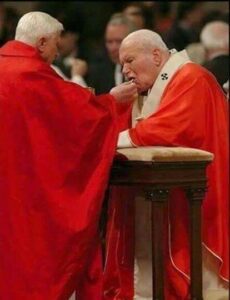 “…the Eucharist is the sum and summary of our faith: ‘Our way of thinking is attuned to the Eucharist, and the Eucharist, in turn, confirms our way of thinking.” Catechism of the Catholic Church, 1327
“…the Eucharist is the sum and summary of our faith: ‘Our way of thinking is attuned to the Eucharist, and the Eucharist, in turn, confirms our way of thinking.” Catechism of the Catholic Church, 1327
“The Eucharist is “the source and summit of the Christian life.” The other sacraments, and indeed all ecclesiastical ministries and works of the spostolate, are bound up with the Eucharist and are oriented toward it. For in the Blessed Eucharist is contained the whole spiritual good of the Church, namely Christ himself, our Pasch.” Catechism of the Catholic Church, 1324
Celebration of First Eucharist for children usually takes place during the Easter Season. Preparation for the first reception of holy Eucharist takes place with the preparation for the sacrament of Confirmation. With the reception of their First Eucharist our children are fully initiated into the Catholic Church.
Contact person: Bailey Delaney. Email: bdelaney@stbrigid-midland.org
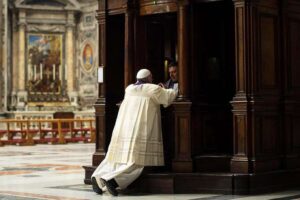 “During his public life, Jesus not only forgave sins but also made plain the effect of this forgiveness: he reintegrated forgiven sinners into the community of the People of God from which sin had alienated or even excluded them” Catechism of the Catholic Church, 1443
“During his public life, Jesus not only forgave sins but also made plain the effect of this forgiveness: he reintegrated forgiven sinners into the community of the People of God from which sin had alienated or even excluded them” Catechism of the Catholic Church, 1443
Celebration of the Sacrament of Reconciliation takes several different forms including individually at 4:15pm to 5:00pm on Sundays (Check current parish bulletin) and also communally. The communal form usually is celebrated during the seasons of Advent and Lent.
Private appointments can also be arranged by contacting the parish office.
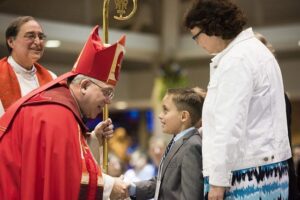 Receiving the Sacrament of Confirmation completes your initiation into the Catholic Church and empowers you to live out the faith. Through Confirmation you are “more perfectly bound to the Church and are enriched with a special strength of the Holy Spirit.” (CCC 1285)
Receiving the Sacrament of Confirmation completes your initiation into the Catholic Church and empowers you to live out the faith. Through Confirmation you are “more perfectly bound to the Church and are enriched with a special strength of the Holy Spirit.” (CCC 1285)
Confirmation is a Catholic Sacrament of mature Christian commitment and a deepening of baptismal gifts. It is one of the three Sacraments of Initiation for Catholics. It is most often associated with the gifts of the Holy Spirit. Only those already baptized can and should receive this sacrament which can be received only once. To receive Confirmation efficaciously the candidate must be in the state of grace. Youth should begin the two-year process between the ages of 12-14 years old, though older high school students can join if they miss the earlier window. They can be confirmed between ages 13-18 after finishing the two-year discernment process.
Contact person: Bailey Delaney. Email: bdelaney@stbrigid-midland.org
“The consent by which the spouses mutually give and receive one another is sealed by God himself. (Mk 10:9) From their covenant arises ‘an institution, confirmed by the divine law, …even in the eyes of society.’[GS 48§1]” Catechism of the Catholic Church, 1639
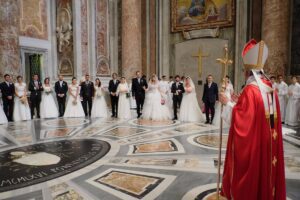
The sacrament of Marriage, in accordance with Church law, requires a minimum of six months’ preparation period. Marriages are celebrated any day of the week outside the Advent and Lenten Season. The sacrament of Marriage within Eucharist can be celebrated as part of a Sunday liturgy, like many other Sacraments of the Church.
Contact Person: Deacon Al Oliver at (989) 631-1596 or Father Stephen Blaxton at (989) 835-7121 ext 34
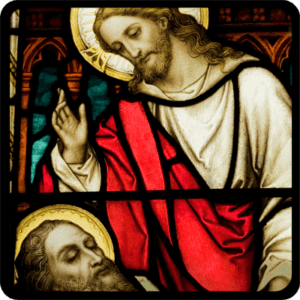 “Heal the sick!” (Mt 10:8). The Church has received this charge from the Lord and strives to carry it out by taking care of the sick as well as by accompanying them with her prayer of intercession.” Catechism of the Catholic Church, 1509
“Heal the sick!” (Mt 10:8). The Church has received this charge from the Lord and strives to carry it out by taking care of the sick as well as by accompanying them with her prayer of intercession.” Catechism of the Catholic Church, 1509
The Sacrament of Anointing of the Sick is not reserved only for the dying or terminally ill. Anyone who is facing medical issues, surgery, etc. is encouraged to receive the Sacrament. It may be celebrated numerous times as in other Sacraments.
The sacrament of the anointing of the sick is available for those who wish (at home, at the hospital, or after any liturgy). Mass with the Anointing of the Sick is celebrated annually.
Contact Person: Father Stephen Blaxton at (989) 835-7121 ext 34
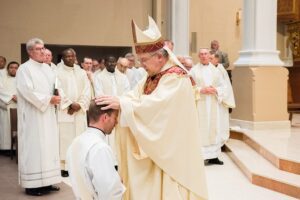 “You are a priest forever, a priest like Melchizedek of old.” -Psalm 110.
“You are a priest forever, a priest like Melchizedek of old.” -Psalm 110.
“Everything that the priesthood of the Old Covenant prefigured finds its fulfillment in Christ Jesus, the “one mediator between God and men.” The Christian tradition considers Melchizedek, “priest of God Most High,” as a prefiguration of the priesthood of Christ, the unique “high priest after the order of Melchizedek”; “holy, blameless, unstained,” “by a single offering he has perfected for all time those who are sanctified,” that is, by the unique sacrifice of the cross.” Catechism of the Catholic Church, 1544
“This sacrament configures the recipient to Christ by a special grace of the Holy Spirit, so that he may serve as Christ’s instrument for his Church.” Catechism of the Catholic Church, 1581
Those interested in more information regarding vocations should contact the Diocese of Saginaw Vocations Office or Father Stephen Blaxton.
